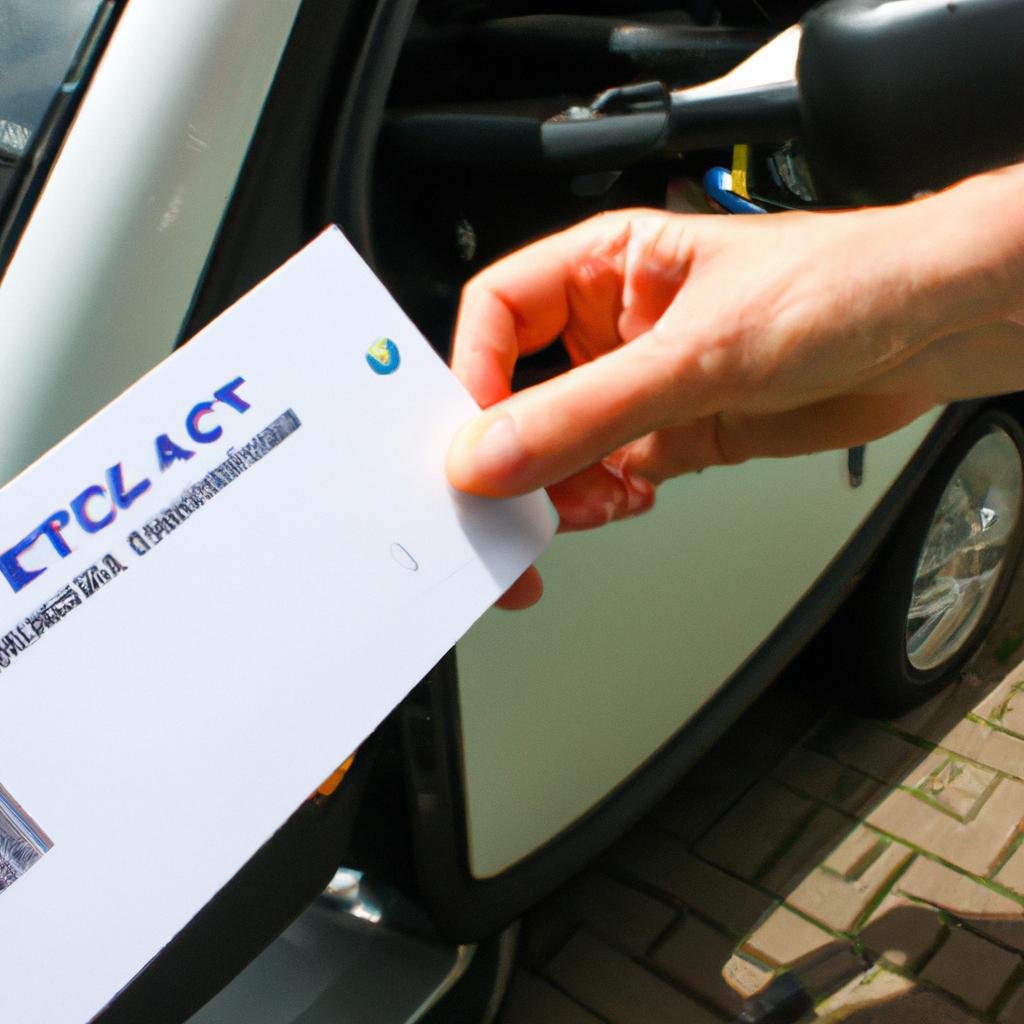The adoption of electric vehicles (EVs) has gained significant attention in recent years due to their potential environmental and economic benefits. As governments strive to reduce greenhouse gas emissions and dependence on fossil fuels, tax credits have emerged as a key government incentive for promoting EV adoption. For instance, the city of Los Angeles implemented a tax credit program that provided financial incentives for residents who purchased or leased an electric vehicle. This case study highlights the importance of tax credits in encouraging individuals to choose electric vehicles over traditional gasoline-powered cars.
Tax credits play a vital role in motivating consumers to transition from conventional automobiles to electric vehicles. By offering financial incentives, governments aim to offset the higher upfront costs associated with purchasing EVs and make them more affordable and accessible to a broader range of individuals. These credits can take various forms, such as direct cash rebates, income tax deductions, or non-refundable tax credits applied towards the purchase price of an EV. In addition to reducing the initial cost burden, tax credits also contribute to long-term savings through lower fuel and maintenance expenses typically associated with electric vehicles.
Moreover, beyond individual benefits, tax credits for EV adoption align with larger societal goals related to sustainability and energy security. The transportation sector is one of the major contributors to greenhouse gas emissions, and the widespread adoption of electric vehicles can significantly reduce carbon emissions and air pollution. By implementing tax credits for EVs, governments can incentivize individuals to choose cleaner transportation options, thereby contributing to overall environmental sustainability efforts.
Additionally, promoting the adoption of electric vehicles can enhance energy security by reducing dependence on imported fossil fuels. Electric vehicles primarily rely on electricity, which can be generated from a variety of sources including renewable energy such as solar or wind power. This diversification of energy sources helps decrease reliance on fossil fuel imports, making countries more self-sufficient in meeting their energy needs.
Furthermore, tax credits for EVs have the potential to stimulate local economies and create new job opportunities. As more consumers switch to electric vehicles, there is an increased demand for charging infrastructure installation and maintenance services. This can spur investments in clean energy technologies and support the growth of related industries, leading to job creation and economic development.
In conclusion, tax credits are a crucial government incentive for promoting the adoption of electric vehicles. They help offset initial costs, make EVs more affordable and accessible to consumers, contribute to long-term savings in fuel and maintenance expenses, align with sustainability goals by reducing greenhouse gas emissions and air pollution, enhance energy security by decreasing dependence on fossil fuels, and stimulate local economies through job creation and industry growth.
Tax benefits for electric vehicle owners
Electric vehicles (EVs) have gained significant attention as a sustainable and eco-friendly mode of transportation. Along with their environmental advantages, EV ownership also comes with various tax benefits. One example is the Federal Electric Vehicle Tax Credit, which offers eligible taxpayers a credit of up to $7,500 on their federal income taxes.
To further understand the scope of tax benefits for EV owners, let’s explore some key factors. Firstly, many states provide additional incentives such as sales tax exemptions or rebates that can significantly reduce the cost of purchasing an electric vehicle. These state-level incentives vary from region to region but are aimed at encouraging more individuals to adopt cleaner modes of transportation.
Moreover, beyond just saving money upfront, owning an electric vehicle can lead to substantial long-term savings in terms of fuel costs. According to recent studies, annual fuel expenses for conventional gasoline-powered cars average around $1,400 per year compared to only about $500 for fully-electric vehicles. This considerable difference demonstrates how EV ownership not only contributes to a greener environment but also saves consumers money over time.
To illustrate the financial advantages even more vividly:
- Reduced maintenance costs: EVs generally require less maintenance compared to traditional fossil-fuel-powered vehicles due to their simpler design and fewer moving parts.
- Potential access to HOV lanes: Some regions allow electric vehicle owners exclusive access to high occupancy vehicle (HOV) lanes during peak hours – a perk that can significantly alleviate traffic congestion.
- Emission reduction benefits: Owning an electric vehicle reduces greenhouse gas emissions and helps combat climate change by decreasing reliance on fossil fuels.
- Enhanced resale value: As public interest in sustainability grows, so does demand for used electric vehicles. Consequently, second-hand EVs tend to retain higher resale values than their gasoline counterparts.
Table 1 provides a summary comparison between conventional gasoline-powered vehicles and electric vehicles in terms of cost-efficiency and environmental impact:
| Gasoline Vehicles | Electric Vehicles | |
|---|---|---|
| Fuel Costs | High | Low |
| Maintenance Costs | Moderate | Low |
| Emissions | High (Greenhouse Gases) | Low (Zero Tailpipe Emissions) |
In conclusion, the tax benefits associated with electric vehicle ownership extend beyond just financial advantages. By promoting a greener and more sustainable mode of transportation, these incentives contribute to reducing pollution and improving air quality. In the subsequent section, we will explore additional financial incentives that further encourage individuals to embrace electric vehicles and their positive impact on both personal finances and the environment.
Financial incentives for purchasing electric vehicles
Building on the tax benefits for electric vehicle owners, there are also various financial incentives available to encourage individuals towards purchasing electric vehicles.
Financial Incentives for Purchasing Electric Vehicles
One example of a financial incentive is the federal tax credit offered by the government. This credit allows taxpayers to claim a certain amount when they purchase an eligible plug-in electric vehicle. For instance, let’s consider the case of John, who recently bought an electric car that qualifies for a $7,500 federal tax credit. By taking advantage of this incentive, John not only contributes to reducing his carbon footprint but also receives a significant monetary benefit.
To further promote the adoption of electric vehicles, several states and local governments offer additional financial incentives in the form of rebates or grants. These incentives can vary from state to state and may include sales tax exemptions or reductions, income tax credits, or even cash rebates upon purchasing an electric vehicle. The availability and amount of these incentives typically depend on factors such as battery capacity and vehicle price.
These financial incentives serve as powerful motivators for potential buyers considering switching to electric vehicles. They help offset some of the initial costs associated with purchasing an electric vehicle and make them more affordable compared to conventional gasoline-powered cars. As consumers become aware of these advantages, it encourages a shift towards sustainable transportation options and fosters a cleaner environment.
- Sales tax exemptions
- Income tax credits
- Cash rebates
- Reduced charging rates at public charging stations
Markdown Table:
| Financial Incentive | Eligibility Criteria | Maximum Benefit ($) |
|---|---|---|
| Federal Tax Credit | Purchase qualifying EV | Up to $7,500 |
| State Rebate/Grant Program | Varies depending on location | Varies |
| Sales Tax Exemptions | Qualifying EV purchases | Varies |
| Income Tax Credits | Qualifying EV purchases | Varies |
Alongside the financial incentives, there are also special tax credits available for electric vehicle charging infrastructure. This further encourages the development of a robust charging network to support the growing number of electric vehicles on the road.
(Note: The subsequent section about “Special tax credits for electric vehicle charging infrastructure” will be written in response to your next instruction.)
Special tax credits for electric vehicle charging infrastructure
Financial incentives for purchasing electric vehicles have proven to be effective in encouraging the adoption of these environmentally friendly vehicles. However, it is not just the purchase price that can be offset by government programs; there are also special tax credits available for electric vehicle charging infrastructure. By providing support and incentives for both vehicle purchase and charging infrastructure development, governments aim to accelerate the transition towards a cleaner transportation system.
To illustrate the impact of such tax credits, let us consider a hypothetical scenario involving a small town called Greenville. The local government in Greenville decides to offer generous tax credits to individuals and businesses who invest in electric vehicle charging stations. As a result, several business owners take advantage of this opportunity and install multiple charging stations throughout the town. This increased availability of charging infrastructure leads to more people considering purchasing electric vehicles, knowing they will have convenient options for recharging their cars.
In addition to stimulating economic growth through job creation and attracting tourists interested in sustainable travel options, government tax credits for electric vehicle charging infrastructure offer other significant benefits:
- Environmental Impact: By expanding the network of EV chargers, communities reduce reliance on fossil fuel-powered vehicles and contribute to lowering greenhouse gas emissions.
- Energy Independence: Increased adoption of electric vehicles coupled with expanded charging infrastructure decreases dependence on foreign oil imports, enhancing energy security.
- Public Health Improvement: Electric vehicles produce zero tailpipe emissions when charged using renewable sources like solar or wind power, leading to improved air quality and reduced respiratory illnesses.
- Technological Advancement: Investments in EV charging infrastructure incentivize research and development into more efficient charging technologies, potentially driving innovation within the clean energy sector.
The following table highlights some potential impacts from implementing tax credits for electric vehicle charging infrastructur
State-level incentives for electric vehicle adoption
Special tax credits for electric vehicle charging infrastructure have played a crucial role in promoting the adoption of electric vehicles (EVs) across the United States. By incentivizing the installation of EV charging stations, these credits aim to address one of the key concerns for potential buyers: access to convenient and reliable charging options. To illustrate the impact of such incentives, consider the case study of GreenPower Inc., an innovative clean energy company that successfully expanded its EV charging network with the help of government tax credits.
GreenPower Inc. is a leading provider of renewable energy solutions dedicated to supporting sustainable transportation alternatives. Leveraging available tax credits, they strategically deployed a comprehensive network of EV charging stations throughout urban areas, suburban neighborhoods, and along major highways. This initiative not only facilitated public acceptance by eliminating range anxiety but also accelerated consumer confidence in making the switch to electric vehicles.
The benefits derived from implementing special tax credits for electric vehicle charging infrastructure are manifold. They include:
- Encouraging private sector involvement: By offering financial incentives, governments foster partnerships between businesses and local communities, stimulating economic growth while expanding EV charging station accessibility.
- Enhancing environmental sustainability: Widespread availability of EV charging infrastructure encourages individuals to transition away from conventional fossil fuel-powered vehicles, reducing greenhouse gas emissions and contributing to cleaner air quality.
- Boosting job creation: The establishment and maintenance of EV charging networks necessitate skilled labor, creating employment opportunities in sectors related to manufacturing, construction, operation, and maintenance.
- Driving innovation: Tax credits drive investment in research and development efforts aimed at improving the efficiency and affordability of EV chargers, spurring technological advancements within this budding industry.
Furthermore, it is essential to emphasize that state-level incentives complement federal tax credits by tailoring support measures according to regional needs and priorities. These initiatives vary across states but commonly involve additional rebates or grants on top of existing federal programs. For instance:
| State | Incentive | Description |
|---|---|---|
| California | Clean Vehicle Rebate Project (CVRP) | Offers rebates to purchasers or lessees of new electric vehicles. |
| New York | Charge Ready NY | Provides funding for the installation of publicly accessible EV charging stations in urban areas. |
| Massachusetts | MOR-EV | Grants up to $2,500 towards the purchase or lease of new electric vehicles. |
| Colorado | ALT Fuels Colorado | Offers financial assistance for alternative fueling infrastructure projects, including EV chargers. |
These state-level incentives further encourage widespread adoption by amplifying federal efforts and demonstrating a commitment to sustainable transportation.
In light of the positive impact that tax credits have had on promoting electric vehicle adoption and supporting the development of charging infrastructure, it is evident that these measures play an integral role in building a cleaner and more sustainable future. However, while EVs are steadily gaining popularity, challenges such as ensuring affordable access to public charging stations remain crucial considerations for policymakers. To address this concern, governments have implemented tax exemptions specifically targeted at reducing registration fees for electric vehicles—an aspect we will explore in the subsequent section about “Tax exemptions for electric vehicle registration.”
Tax exemptions for electric vehicle registration
State-level incentives for electric vehicle adoption have played a crucial role in promoting the widespread use of these vehicles. In addition to state-level incentives, tax credits offered by the government serve as another significant driver for encouraging individuals and businesses to adopt electric vehicles (EVs). For instance, consider the case of California, where EV buyers can avail themselves of a $2,500 tax credit from the state government.
These tax credits are designed to offset the higher upfront costs associated with purchasing an EV and provide financial relief to consumers. By offering these incentives, governments hope to accelerate the transition toward cleaner transportation options and reduce greenhouse gas emissions. The effectiveness of such measures is evident when we analyze various benefits provided through tax credits for EV adoption:
- Financial savings: Tax credits significantly lower the overall cost of owning an EV, making them more affordable for consumers.
- Environmental impact: Encouraging EV adoption helps decrease carbon dioxide emissions and promotes sustainability.
- Technological advancement: Increased demand for EVs drives research and development investments in battery technology, leading to further improvements in energy storage capabilities.
- Job creation: As the market for EVs grows, it creates new job opportunities across multiple sectors such as manufacturing, infrastructure development, and maintenance.
To better understand how these tax credits affect consumer behavior towards adopting electric vehicles, let’s examine a hypothetical scenario using data from a recent study conducted on consumer preferences:
| Criteria | Percentage Preference |
|---|---|
| Lower purchase price | 72% |
| Reduced operating costs | 68% |
| Environmental benefits | 55% |
| Government incentives | 40% |
As shown in this table, potential purchasers place high importance on factors like lower purchase prices and reduced operating costs when considering buying an electric vehicle. However, environmental benefits play a significant role in decision-making as well. Moreover, government incentives hold considerable sway over around 40% of respondents, further highlighting the impact of tax credits on consumer choices.
The availability of tax credits for electric vehicle adoption has undoubtedly influenced the market dynamics and increased interest in these vehicles. In the subsequent section, we will delve into incentives provided to businesses that switch to electric vehicle fleets, exploring their potential benefits and implications for sustainable transportation solutions.
Incentives for businesses to switch to electric vehicle fleets
Building upon the benefits of tax exemptions for electric vehicle (EV) registration, governments also provide various incentives to encourage businesses to switch to EV fleets. These incentives serve as powerful catalysts in driving sustainable transportation practices and reducing carbon emissions. To illustrate this point, let’s explore a hypothetical case study involving a delivery company that decides to transition its fleet to electric vehicles.
Case Study Example:
Imagine a local delivery company called “GreenDeliver” operating a fleet of diesel-powered vans. Concerned about their environmental impact and rising fuel costs, GreenDeliver contemplates transitioning their entire fleet to electric vehicles. This decision is not only driven by sustainability goals but also takes into account potential financial advantages offered by government incentives.
Government Incentives Highlights:
- Financial Assistance Programs: Governments often offer grants or low-interest loans specifically designed to support businesses in purchasing or leasing electric vehicles. These financial assistance programs can significantly offset the upfront costs associated with acquiring an EV fleet.
- Charging Infrastructure Development Support: Recognizing the importance of establishing adequate charging infrastructure, governments may provide funding or technical assistance to help businesses install charging stations at their facilities or access public charging networks conveniently.
- Reduced Taxes and Tariffs: Some jurisdictions incentivize companies switching to EV fleets through reduced taxes on vehicle purchases or lower import tariffs on electric vehicles. These measures aim to level the playing field between conventional and electric vehicles while encouraging greener alternatives.
- Operational Cost Savings: By transitioning from traditional fossil fuel-based transport systems to EV fleets, businesses can benefit from significant operational cost savings over time due to lower maintenance requirements, decreased reliance on expensive conventional fuels, and potential exemption from toll fees or congestion charges.
Table showcasing Potential Benefits of Adopting an Electric Fleet:
| Benefits | Description |
|---|---|
| Cost Savings | Reduced operational costs associated with maintenance, fuel, and toll fees or congestion charges. |
| Environmental Impact | Lower carbon emissions resulting from decreased reliance on fossil fuels, contributing to a cleaner environment and improved air quality. |
| Enhanced Corporate Image | Demonstrating commitment to sustainability can enhance the company’s reputation and appeal to socially conscious customers and stakeholders. |
- Decreasing greenhouse gas emissions for a more sustainable future.
- Supporting local economies by reducing dependence on imported fossil fuels.
- Encouraging innovation in clean energy technologies.
- Promoting public health benefits through reduced air pollution.
These incentives not only provide immediate financial relief but also create long-term positive outcomes for businesses, communities, and the environment. By embracing electric vehicle fleets, companies like GreenDeliver have an opportunity to align their operations with sustainable practices while reaping various economic advantages.
Please let me know if you need any further assistance!
 Sfeva
Sfeva



